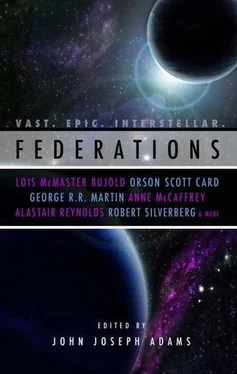He was so transfixed by his fit of analytical brilliance that he almost wheeled right past Galactic Central and back out into the Galactic Boonies. But he didn’t—this story won’t run long enough for a lot of mistakes, either.
Being a space cadet helped him get through the entry formalities in jig time—which, since he didn’t dance, was more than a little challenging. A day and a half later, the freedom of Galactic Central was his, as long as the GPS and radiological tracking devices surgically implanted near his wazoo gave answers the powers that be approved of. Otherwise, the tiny nuke implanted near that very same sensitive place would sadly spoil our upcoming dénouement, to say nothing of half a city block. So we won’t.
He hopped on the closest available public transport, discovered it was going the wrong way (see?—we did have room for a mistake after all), hopped off, and got on, this time, as luck (and the necessities of plotting) would have it, going toward the sublime (or something) residence of the beloved (or something) Galactic Emperor and Empress.
No sooner had he arrived—talk about timing! I mean, really!—than a giant chainsaw suddenly appeared in the sky and started carving away at (are you surprised?) the throne room… and the antechamber. People screamed. People ran. People coughed from flying sawdust. People of several different flavors got turned into hamburger of several different flavors. People inside the palace, caught by the paralyzer ray that went with the saw, didn’t do much of anything.
Guards outside the palace started shooting at the parts of the chainsaw crunching through the walls. Quick-thinking Rufus Q. Shupilluliumash fired at the power button instead: a dot a centimeter wide three kilometers up in the air. Being a Patrol-trained markshamster and luckier than Lucky Pierre, he hit it dead on, the very first try.
The chainsaw stopped chainsawing. It fell out of the sky and smashed one of the ritziest neighborhoods—actually, several of the ritziest neighborhoods, because that was a big mother of a chainsaw—of Galactic Central to cottage cheese. Our bold space cadet cared nothing for that, though. He was doing his duty, and he was damned if he’d let common sense stand in his way.
Dashing toward the chainsaw’s survival capsule (How did he know where it was? He just knew. This is that kind of story.), he was Rufus Q. Shupilluliumash on the spot when a saurian humanoid, an ammonia/ice blob in a hotsuit, a kumquat, and a Frenchman came staggering out.
“You’re under arrest!” he shouted, covering them with his ever-reliable blaster. “Suspicion of firing a chainsaw without a license and operating an unauthorized space drive within city limits. Don’t nobody move!”
Nobody didn’t move… or something like that. “What do you know about the Royal Drive?” the Frenchman sneered. “How do you know it’s unauthorized?”
“It must be unauthorized, because I couldn’t Google it. And I know the Royal Drive uses the hellacious energy output from mixing”—our space cadet paused to build the moment, for he was indeed punster as well as hamster—“chamber and antechamber to propel your spacecraft across the Galaxy in pursuance of your nefarious ends. But now you’re busted, space scum!”
The Frenchman, the kumquat, and the saurian humanoid blanched. Rufus Q. Shupilluliumash presumed the ammonia/ice blob did, too—it is, after all, what self-respecting villains do under such circumstances—but the hotsuit kept him from being sure. Palace guards came up behind him. “What do we do with them, sir?” they asked respectfully.
“Take them away,” the hamster replied grandly. “They will trouble the spaceways no more.”
Your omniscient narrator also has the pleasure to report that, shortly thereafter, Space Cadet Rufus Q. Shupilluliumash became Ensign Rufus Q. Shupilluliumash, with all the rights and privileges appertaining thereto. (Of course, he knew that wouldn’t happen. Didn’t you?) Our space cadet’s actions in this case were deemed to be in the highest tradition of the Space Patrol.
PRISONS
by Kevin J. Anderson and Doug Beason
Bestselling author Kevin J. Anderson has written nearly a hundred novels, many of them co-written (as this story is) with Doug Beason, with his wife, Rebecca Moesta, or with Brian Herbert, with whom he continues Frank Herbert’s Dune saga. Anderson has written several media tie-ins, for such properties as Star Wars and The X-Files . His most recent original project is the Saga of Seven Suns series, which concluded with last year’s The Ashes of Worlds , and his nautical fantasy epic Terra Incognita .
Doug Beason is a physicist and a retired Air Force Colonel. He is currently works at the Los Alamos National Laboratory, where he is responsible for programs that reduce the global threat of weapons of mass destruction. He has published fourteen books, eight of them in collaboration with Anderson. The writing team’s novel Assemblers of Infinity was a finalist for the Nebula Award.
“Prisons,” first published in Amazing Stories, explores the repercussions of a revolt on a prison planet and shows how one person’s existence influences the decisions of those in power. It examines black market trade, brainwashing, and how far some will go for revenge.
I am still called the Warden. The prisoners consider it an ironic jest.
Barely a meter square, the forcewalls form the boundaries of my holographic body. Once this felt like a throne, an isolated position from which I could control the workings of Bastille. Now, though, I must look out and watch my former prisoners laughing at me.
This projection has been an image of authority to them. Since living on this prison world was too great a punishment to inflict upon any real warden or guards, my Artificial Personality was entrusted to watch over this compound. I am based on a real person—a great man, I think—a proud man with many accomplishments. But I have failed here.
Amu led the prisoners in their revolt; he convinced them that Bastille is a self-sufficient planet after all their forced terraforming work for the Federation. They have survived all Federation attempts to reoccupy the world, keeping the invaders out with the same systems once intended to keep the prisoners in. Besides the prisoners, I am the only one left.
Once, I ran the environmental systems here, the production accounting, the resources inventory. I monitored the automated digging and processing machinery outside. I controlled the fleet of tiny piranha interceptors in orbit that would destroy any ship trying to escape. But now I am powerless.
Amu’s lover Theowane comes to taunt me every day, to gloat over her triumph. She paces up and down the corridor outside the forcewalls. To me, she is flaunting her freedom to go where she wishes. I do not think it is unintentional.
At the time of the revolt, Theowane used her computer skills to introduce a worm program that rewrote the control links around my Personality, leaving me isolated and helpless. If I attempt to regain control, the worm will delete my existence. I feel as if I have a knife at my throat, and I am too afraid to act.
At moments such as this, I can appreciate the sophistication of my Personality, which allows me to feel the full range of human emotions.
It allows me to hate Theowane and what she has done to me.
• • •
Theowane makes herself smile, but the Warden refuses to look at her. It annoys her when he broods like this.
“I am busy,” he says.
Leaving him to dwell on his fate, Theowane crosses to the panorama window. Huge, remotely driven excavators and haulers churn the ground, rearing up, crunching rock and digesting it for usable minerals. At least , she thinks, Bastille’s resources are put to our own use, not exported for someone else.
Читать дальше












